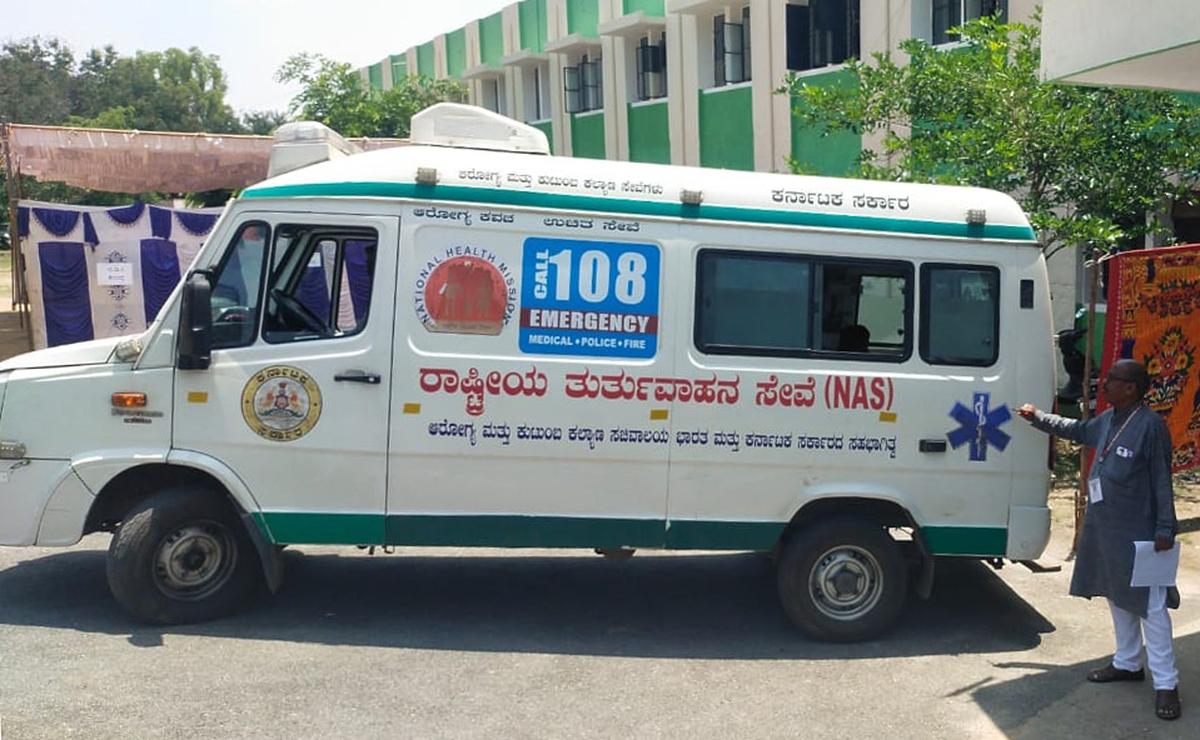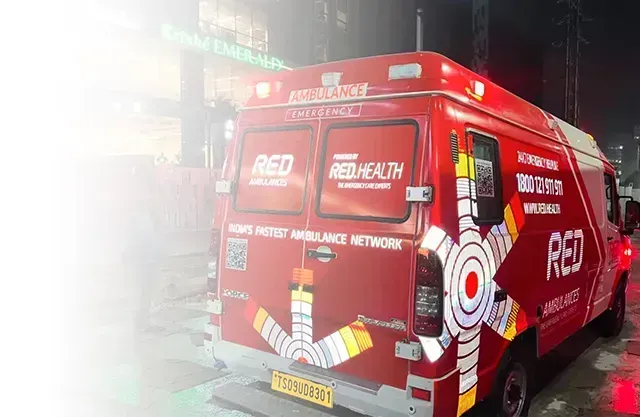In a dramatic and heart-rending incident in Belagavi district, a farmer was forced to carry his ailing wife on his shoulders after an ambulance could not reach their remote village due to poor road conditions. The incident, captured on video, has gone viral on social media, evoking widespread sympathy and highlighting the struggles faced by residents in rural areas. Locals praised the farmer’s determination and resilience, calling it a heroic act of love and responsibility in the face of adversity.
According to villagers, the woman required urgent medical attention, but the ambulance could not navigate the narrow, muddy tracks connecting the village to the main road. With no alternative, the farmer chose to carry his wife on foot to the nearest accessible road where emergency services could finally take over. The journey, fraught with exhaustion and difficulty, underscores the challenges faced by rural residents in accessing timely healthcare, especially during emergencies.
Authorities in Belagavi have expressed concern over the incident and assured immediate action to improve medical accessibility in remote villages. Local health officials stated that plans are underway to enhance ambulance services, including better-equipped vehicles and coordination for hard-to-reach areas. Meanwhile, social media users have lauded the farmer’s selfless act, calling for structural reforms to prevent similar incidents and ensure that life-saving services are available to all citizens, regardless of location.

Rural Healthcare Challenges Highlighted
This incident has brought renewed attention to the difficulties of rural healthcare delivery in Belagavi district. Villagers pointed out that poorly maintained roads, lack of proper transport, and limited emergency infrastructure often put lives at risk. Medical professionals have stressed that timely access to healthcare is critical, particularly for women, elderly patients, and those with chronic illnesses. The farmer’s courageous effort has highlighted the urgent need for systemic improvements to ensure no citizen is forced to face such perilous journeys in life-threatening situations.
Local community leaders have urged authorities to invest in better ambulance services and road infrastructure in remote areas. Suggestions include deploying smaller, off-road vehicles capable of navigating rough terrain and establishing temporary medical outposts in distant villages. Activists argue that such measures are essential for equitable healthcare access and could prevent tragedies in the future. Meanwhile, villagers continue to rally for immediate solutions, emphasizing that no family should endure such hardships again.
Villagers in the affected area of Belagavi district have described the farmer’s act as both heroic and heartbreaking. Many noted that such incidents are not uncommon in remote villages, where poor roads and inadequate transport make accessing medical care a daily struggle. Residents said they were deeply moved by the farmer’s determination, with several families coming forward to offer support and highlight the persistent gaps in emergency healthcare infrastructure that endanger rural lives.
Local health workers emphasized that the incident underscores a structural problem in rural medical services. Ambulances often cannot navigate narrow, unpaved paths, leaving families to improvise during emergencies. Officials acknowledged that the current fleet and service routes are insufficient for reaching remote villages quickly. Experts suggest that upgrading rural roads, deploying off-road emergency vehicles, and creating community-level first response teams could dramatically improve timely access to medical care in such areas.
The district administration has promised to investigate the incident and address the shortcomings that forced the farmer to carry his wife on foot. Officials assured that plans are being developed to expand ambulance coverage, improve emergency coordination, and establish better communication channels for residents in remote areas. Authorities highlighted that while immediate action is being taken, long-term infrastructure improvements will require sustained investment and community engagement.
Healthcare experts have pointed out that maternal and women’s health in rural Karnataka remains particularly vulnerable due to transportation and access issues. Delays in reaching medical care can exacerbate illnesses, leading to complications and preventable fatalities. They argue that the farmer’s act, though heroic, highlights systemic failures that must be urgently addressed to protect women and other vulnerable groups in rural districts.
Social media coverage of the event has brought national attention to rural healthcare challenges. Videos of the farmer carrying his wife have been widely shared, with commentators praising his courage while criticizing government inefficiencies. Public sentiment largely supports calls for improved infrastructure and better-equipped emergency services. Many citizens suggested policy reforms that include mobile health units and strengthened rural transport networks to prevent similar situations.
Activists have pointed out that rural emergency preparedness in Karnataka has long been neglected. While urban centers benefit from fast response systems, villages remain reliant on ad hoc solutions, putting lives at risk. The incident has prompted NGOs and civil society groups to demand comprehensive reforms, including investment in ambulance services, training for local first responders, and better coordination between health and transport departments.
The local government has begun consultations with community leaders to identify the most vulnerable villages in Belagavi district. By mapping areas with poor road connectivity and limited emergency access, officials hope to prioritize ambulance deployment and infrastructure upgrades. Authorities emphasized that community input will be crucial in designing practical solutions that ensure rapid medical response for residents in even the most remote locations.
Villagers have suggested temporary solutions such as local transport volunteers, who can assist in emergencies until ambulances arrive. This community-based approach could serve as an immediate measure to bridge gaps in healthcare access. Experts note that empowering local communities in emergency response not only saves lives but also fosters resilience and trust between citizens and government authorities.

Social workers in the region have stressed the importance of mental health support for families experiencing medical emergencies. The stress and trauma of navigating life-threatening situations without proper services can have lasting effects. They advocate for counseling programs and support groups to accompany infrastructural improvements, ensuring that emotional as well as physical wellbeing is addressed for affected families.
The incident has sparked discussions about integrating technology into rural emergency services. Officials are considering GPS-enabled tracking for ambulances, real-time communication apps for residents, and centralized dispatch systems to reduce response times. Such innovations could transform rural healthcare delivery, making it more efficient and responsive while reducing the need for physically exhausting alternatives like carrying patients on foot.
Education campaigns are also being proposed to inform villagers about proper emergency protocols and available resources. These campaigns would provide guidance on contacting authorities, first aid basics, and the use of community support networks during medical crises. By increasing awareness and preparedness, officials aim to reduce panic and improve outcomes during critical situations.
Lastly, the incident has motivated discussions on broader policy reforms at the state level. Lawmakers are urged to allocate funds for rural healthcare infrastructure, improve transport connectivity, and ensure equitable access to emergency services. Advocates argue that preventing future tragedies requires a combination of investment, planning, and community engagement, transforming isolated heroic acts into a system where no family is forced to bear such burdens alone.
Social Media Reaction and Public Sentiment
The video of the farmer carrying his wife has sparked an outpouring of empathy across social media platforms. Netizens have praised his courage and dedication, describing it as an example of human compassion and determination. The incident has also triggered debates on rural neglect, prompting calls for the government to improve emergency response systems and infrastructure. Many citizens have demanded accountability and quicker implementation of health and transport reforms to prevent similar crises in the future.
Family members of the affected woman expressed gratitude for the farmer’s extraordinary efforts but also voiced frustration at the lack of systemic support. They stressed that no individual should bear such burdens alone, and government responsibility is crucial in ensuring safety and timely healthcare. Local communities have rallied together, highlighting solidarity and the urgent need for policy intervention to prevent such crises.
Officials in Belagavi district have announced plans to deploy smaller, all-terrain emergency vehicles capable of accessing remote areas during adverse weather or poor road conditions. These vehicles are expected to complement the existing ambulance fleet, reducing reliance on manual efforts in emergencies. Authorities stressed that the goal is to prevent situations where families must improvise life-threatening solutions due to infrastructural limitations.

Experts have also emphasized the need for community-level health education and first aid training. Villagers equipped with basic medical knowledge and emergency protocols can provide immediate support while awaiting ambulance services. Such measures, combined with improved transport infrastructure, could significantly reduce mortality and morbidity rates in rural districts, ensuring timely intervention during critical medical situations.
Finally, the incident has prompted broader discussions about equity in healthcare access. Policymakers and social commentators have highlighted that rural populations often face disproportionate risks due to infrastructural neglect. The farmer’s extraordinary efforts, while commendable, underscore the pressing need for systemic reforms to ensure that healthcare and emergency services are available, reliable, and accessible to all residents, regardless of geographic location.
Follow: Karnataka Government
Also read: Home | Channel 6 Network – Latest News, Breaking Updates: Politics, Business, Tech & More

